CILOSI
The Cilosi Research Project is a project led by S. Moriconi and N. Ukrayinchuk funded by the DGEF of the French Ministry of Interiori for the years 2025 and 2026. It aims at exploring immigrant integration by addressing socio-economic and cultural barriers. Through interdisciplinary research, it examines interactions among immigrants, host societies, and policies. Focusing on refugees and women, it aims to enhance integration quality, influencing both academic insights and practical policy improvements.
FaMiGrowth
The FaMiGrowth Research Project is a project led by T. Baudin (PI), S. Moriconi (co-PI) and C. Garcia-Peñalosa (co-PI) funded by the French National Agency for Research (ANR) for the years 2024-2029. It aims at understanding and quantifying the contribution of family migration to the process of economic growth and to the take-off of Western Europe. To reach this objective, our team is developing the European Historical Family Database, which merges some of the most important crowdsourced Genealogical Databases and European nominative censuses.
> www.anr-famigrowth.com/
MALYNES
(Migration And Labor supplY wheN culturE matterS) is a project led by S. Moriconi (PI) and T. Baudin funded by the French National Research Agency (ANR, AAPG 2018) for 2019-2023. The objective of this project is to propose an encompassing framework suited to predict the future effects of migration on labor supply in the European Union, by employing complementary econometric tools used in research on the political economy of migration policy, the economics of culture, and the economics of the household and family formation.
> www.anr-malynes.com
HIU – HFU Dataset
(History of Italian Universities and History of French Universities) is a project led by S. Moriconi. The objective of this project is to develop and exploit to research purposes unique registers that map and date the establishment of higher education institutions in Italy (HIU, developed by S. Moriconi together with E.Cottini and P.Ghinetti) and France (HFU, developed by S.Moriconi with the collaboration of A.Montalbo). Existing sources (e.g.WHED Unesco), have information at the university level that go back to the post-WWII period. The joint HIU-HFU dataset has the advantage of delivering information at the faculty (field of study) level and providing detailed historical information that go back to the XXII Century, in countries characterized by a very long history and tradition of university education. This dataset is used to analyse the multi-fold economic returns associated with the provision of higher education services.
Education Expansion, Skills and Labour Market Success
Project led by the Geneva School of Economics and Management (University of Geneva) and funded by the Swiss National Science Foundation (SNSF) for 2019-2023. The aim of the project is to combine the information available from HIU with the Italian sample of the Survey of Adult Skills (PIAAC) and analyze how the process of creation of skills and competences, determines the individual returns from higher education in terms of wages and employment probabilities.
Asset Protection and Legal Entities
It is a joint project by Chung, K., Lai, T. and Ng, T. and is funded by the Hong Kong Research Grant Council in 2021-2022. The project aims at understanding both theoretically and empirically why firms sometimes organize themselves in a complicated way (e.g. having many legal entities or having subsidiaries in offshore tax havens) and whether this strategy has to do with protecting their assets against litigation risk. The findings of this project can have implications about, e.g., how firms should allocate their physical and human capital in response to the changing external environment.
Opportunity Costs and the Local Effects of Migration
Project led by J. Munoz funded by LEM in 2021-2022. This project is aimed at studying the differential effects of migration by suggesting a novel hypothesis that reconciles preexisting contradictory evidence of the effects of migrants on local communities. Our hypothesis relates the effects of migration to the migrants’ cost of not migrating (i.e. the opportunity cost of migration), and suggest that the consequences of migration vary depending on the migrants’ incentives to migrate. Migration is a key economic issue in current times. According to the United Nations, 258 million persons in the world are migrants, and the majority of them relocated from developing to developed countries. In recent years, this phenomenon has particularly affected European countries by increasing remarkably the share of migrants coming from less developed countries. This type of migration has received a great deal of attention and therefore has been studied by multiple academics. Despite of this, we are still lacking evidence about the relationship of the incentives to migrate and the consequences of migration, and there is also in-existent evidence about how migration affects less developed countries. In recent years, countries like Colombia, which has a much lower GDP per capita compared to Europe, have also experienced an equally big wave of migration that have remained mostly unstudied. The goal of this project is therefore to study it and relate it to the current migration crisis in Europe.
From School-to-Work: The effect local context and economic restructuring on the intergenerational transmission of human capital among immigrants
It is a project led by S. Moriconi and N. Ukrayinchuk (PI), and funded by the Allocations Régionales Hauts de Seine in 2022. The PhD student Mikael Pasternak will write a PhD thesis on the subject applying modern micro-econometric methods. The main objective will be to discuss the channels turning the educational mobility of the descendants of immigrants into professional mobility as well as the quality determinants of this transfer. Special attention will be paid to the analysis of the local context and the economic restructuring of the market e.g. in terms of job polarization at both ends of the qualification scale. The project will also adopt a specific gender perspective related to the analysis of the job expansion patterns. A comparative analysis at regional but also international levels will help to identify the levers to improve the dynamics of this mobility.

